Report on Holistic Health and Mental Illness in Health and Social Care
VerifiedAdded on 2021/04/17
|10
|3621
|25
Report
AI Summary
This report delves into the holistic concept of health, emphasizing informed decision-making, civic responsibility, and the importance of considering ecological, psychosocial, cultural, economic, and personal factors in patient care, as demonstrated through a case study of Mr. Bryan. It explores the impact of mental health on challenging behaviors, learning disabilities, and social isolation, highlighting the need for interventions and addressing medical conditions. The report also examines perceptions of mental illness, the role of health literacy, and the influence of social and cultural factors. It further discusses the significance of social policy, legislation, and the evolution of mental health care, including community-based treatments and the reduction of stigma. The document highlights the importance of integrated approaches, behavioral changes, and the ongoing need for comprehensive care in improving patient outcomes and well-being.
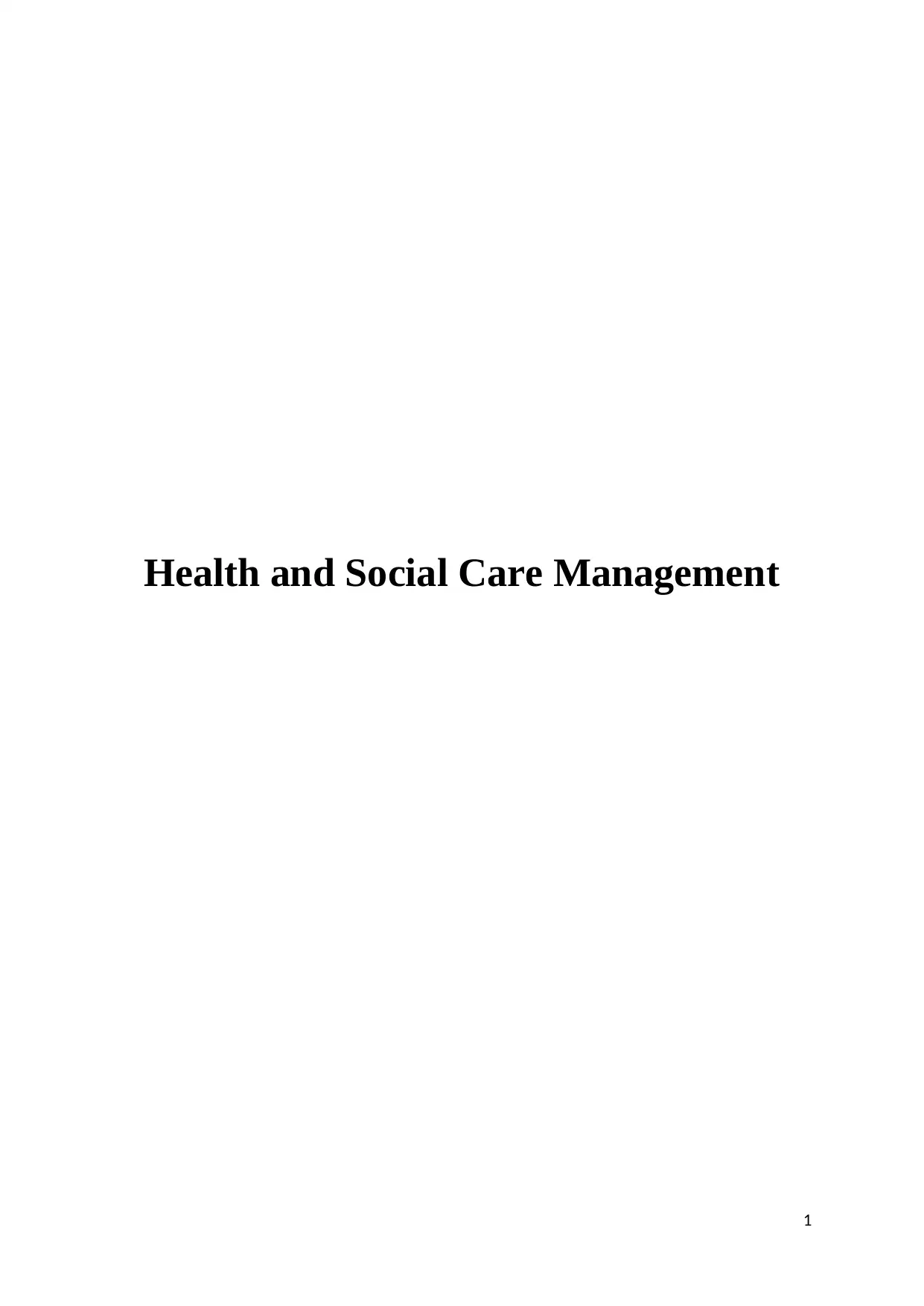
Health and Social Care Management
1
1
Paraphrase This Document
Need a fresh take? Get an instant paraphrase of this document with our AI Paraphraser
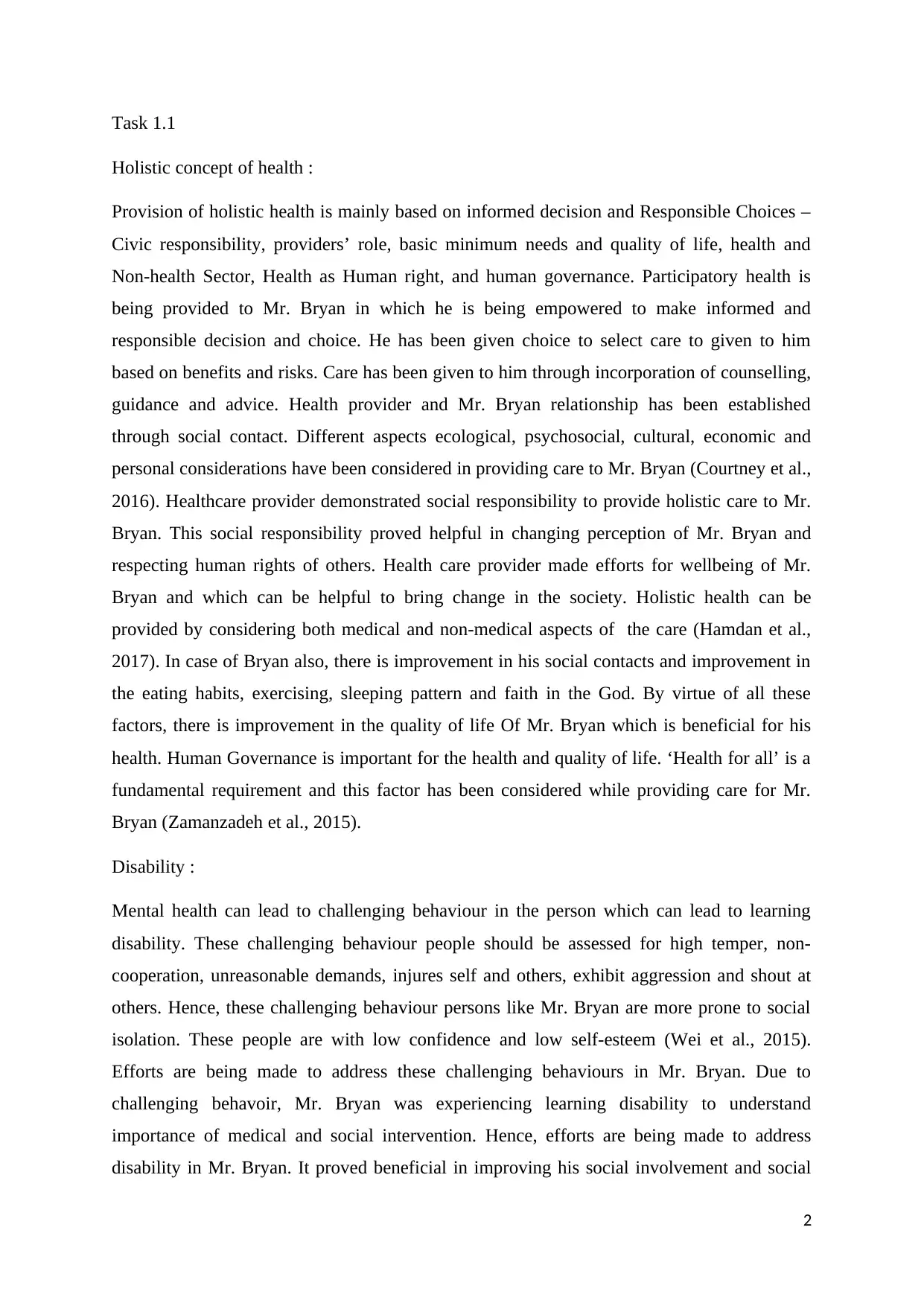
Task 1.1
Holistic concept of health :
Provision of holistic health is mainly based on informed decision and Responsible Choices –
Civic responsibility, providers’ role, basic minimum needs and quality of life, health and
Non-health Sector, Health as Human right, and human governance. Participatory health is
being provided to Mr. Bryan in which he is being empowered to make informed and
responsible decision and choice. He has been given choice to select care to given to him
based on benefits and risks. Care has been given to him through incorporation of counselling,
guidance and advice. Health provider and Mr. Bryan relationship has been established
through social contact. Different aspects ecological, psychosocial, cultural, economic and
personal considerations have been considered in providing care to Mr. Bryan (Courtney et al.,
2016). Healthcare provider demonstrated social responsibility to provide holistic care to Mr.
Bryan. This social responsibility proved helpful in changing perception of Mr. Bryan and
respecting human rights of others. Health care provider made efforts for wellbeing of Mr.
Bryan and which can be helpful to bring change in the society. Holistic health can be
provided by considering both medical and non-medical aspects of the care (Hamdan et al.,
2017). In case of Bryan also, there is improvement in his social contacts and improvement in
the eating habits, exercising, sleeping pattern and faith in the God. By virtue of all these
factors, there is improvement in the quality of life Of Mr. Bryan which is beneficial for his
health. Human Governance is important for the health and quality of life. ‘Health for all’ is a
fundamental requirement and this factor has been considered while providing care for Mr.
Bryan (Zamanzadeh et al., 2015).
Disability :
Mental health can lead to challenging behaviour in the person which can lead to learning
disability. These challenging behaviour people should be assessed for high temper, non-
cooperation, unreasonable demands, injures self and others, exhibit aggression and shout at
others. Hence, these challenging behaviour persons like Mr. Bryan are more prone to social
isolation. These people are with low confidence and low self-esteem (Wei et al., 2015).
Efforts are being made to address these challenging behaviours in Mr. Bryan. Due to
challenging behavoir, Mr. Bryan was experiencing learning disability to understand
importance of medical and social intervention. Hence, efforts are being made to address
disability in Mr. Bryan. It proved beneficial in improving his social involvement and social
2
Holistic concept of health :
Provision of holistic health is mainly based on informed decision and Responsible Choices –
Civic responsibility, providers’ role, basic minimum needs and quality of life, health and
Non-health Sector, Health as Human right, and human governance. Participatory health is
being provided to Mr. Bryan in which he is being empowered to make informed and
responsible decision and choice. He has been given choice to select care to given to him
based on benefits and risks. Care has been given to him through incorporation of counselling,
guidance and advice. Health provider and Mr. Bryan relationship has been established
through social contact. Different aspects ecological, psychosocial, cultural, economic and
personal considerations have been considered in providing care to Mr. Bryan (Courtney et al.,
2016). Healthcare provider demonstrated social responsibility to provide holistic care to Mr.
Bryan. This social responsibility proved helpful in changing perception of Mr. Bryan and
respecting human rights of others. Health care provider made efforts for wellbeing of Mr.
Bryan and which can be helpful to bring change in the society. Holistic health can be
provided by considering both medical and non-medical aspects of the care (Hamdan et al.,
2017). In case of Bryan also, there is improvement in his social contacts and improvement in
the eating habits, exercising, sleeping pattern and faith in the God. By virtue of all these
factors, there is improvement in the quality of life Of Mr. Bryan which is beneficial for his
health. Human Governance is important for the health and quality of life. ‘Health for all’ is a
fundamental requirement and this factor has been considered while providing care for Mr.
Bryan (Zamanzadeh et al., 2015).
Disability :
Mental health can lead to challenging behaviour in the person which can lead to learning
disability. These challenging behaviour people should be assessed for high temper, non-
cooperation, unreasonable demands, injures self and others, exhibit aggression and shout at
others. Hence, these challenging behaviour persons like Mr. Bryan are more prone to social
isolation. These people are with low confidence and low self-esteem (Wei et al., 2015).
Efforts are being made to address these challenging behaviours in Mr. Bryan. Due to
challenging behavoir, Mr. Bryan was experiencing learning disability to understand
importance of medical and social intervention. Hence, efforts are being made to address
disability in Mr. Bryan. It proved beneficial in improving his social involvement and social
2
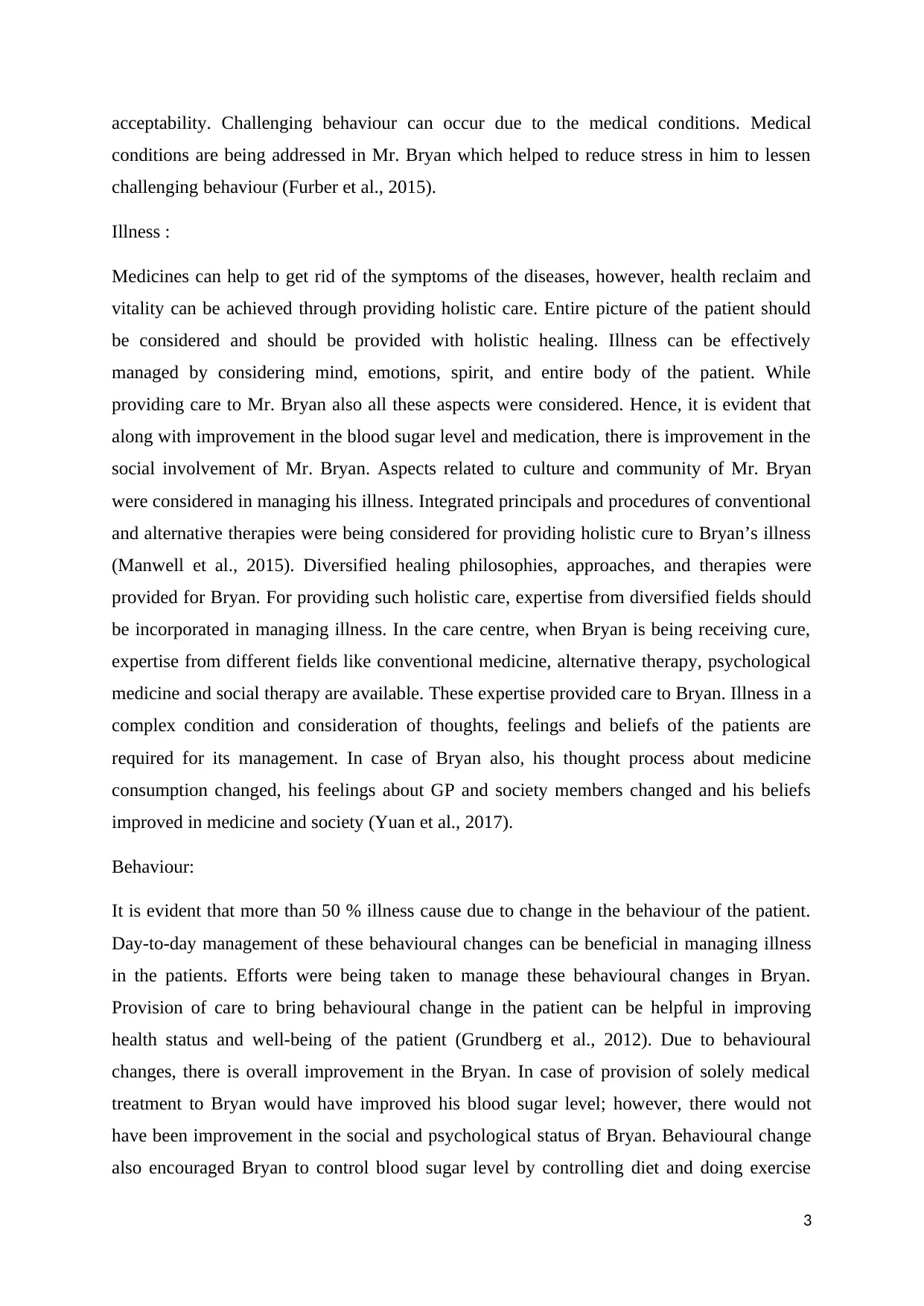
acceptability. Challenging behaviour can occur due to the medical conditions. Medical
conditions are being addressed in Mr. Bryan which helped to reduce stress in him to lessen
challenging behaviour (Furber et al., 2015).
Illness :
Medicines can help to get rid of the symptoms of the diseases, however, health reclaim and
vitality can be achieved through providing holistic care. Entire picture of the patient should
be considered and should be provided with holistic healing. Illness can be effectively
managed by considering mind, emotions, spirit, and entire body of the patient. While
providing care to Mr. Bryan also all these aspects were considered. Hence, it is evident that
along with improvement in the blood sugar level and medication, there is improvement in the
social involvement of Mr. Bryan. Aspects related to culture and community of Mr. Bryan
were considered in managing his illness. Integrated principals and procedures of conventional
and alternative therapies were being considered for providing holistic cure to Bryan’s illness
(Manwell et al., 2015). Diversified healing philosophies, approaches, and therapies were
provided for Bryan. For providing such holistic care, expertise from diversified fields should
be incorporated in managing illness. In the care centre, when Bryan is being receiving cure,
expertise from different fields like conventional medicine, alternative therapy, psychological
medicine and social therapy are available. These expertise provided care to Bryan. Illness in a
complex condition and consideration of thoughts, feelings and beliefs of the patients are
required for its management. In case of Bryan also, his thought process about medicine
consumption changed, his feelings about GP and society members changed and his beliefs
improved in medicine and society (Yuan et al., 2017).
Behaviour:
It is evident that more than 50 % illness cause due to change in the behaviour of the patient.
Day-to-day management of these behavioural changes can be beneficial in managing illness
in the patients. Efforts were being taken to manage these behavioural changes in Bryan.
Provision of care to bring behavioural change in the patient can be helpful in improving
health status and well-being of the patient (Grundberg et al., 2012). Due to behavioural
changes, there is overall improvement in the Bryan. In case of provision of solely medical
treatment to Bryan would have improved his blood sugar level; however, there would not
have been improvement in the social and psychological status of Bryan. Behavioural change
also encouraged Bryan to control blood sugar level by controlling diet and doing exercise
3
conditions are being addressed in Mr. Bryan which helped to reduce stress in him to lessen
challenging behaviour (Furber et al., 2015).
Illness :
Medicines can help to get rid of the symptoms of the diseases, however, health reclaim and
vitality can be achieved through providing holistic care. Entire picture of the patient should
be considered and should be provided with holistic healing. Illness can be effectively
managed by considering mind, emotions, spirit, and entire body of the patient. While
providing care to Mr. Bryan also all these aspects were considered. Hence, it is evident that
along with improvement in the blood sugar level and medication, there is improvement in the
social involvement of Mr. Bryan. Aspects related to culture and community of Mr. Bryan
were considered in managing his illness. Integrated principals and procedures of conventional
and alternative therapies were being considered for providing holistic cure to Bryan’s illness
(Manwell et al., 2015). Diversified healing philosophies, approaches, and therapies were
provided for Bryan. For providing such holistic care, expertise from diversified fields should
be incorporated in managing illness. In the care centre, when Bryan is being receiving cure,
expertise from different fields like conventional medicine, alternative therapy, psychological
medicine and social therapy are available. These expertise provided care to Bryan. Illness in a
complex condition and consideration of thoughts, feelings and beliefs of the patients are
required for its management. In case of Bryan also, his thought process about medicine
consumption changed, his feelings about GP and society members changed and his beliefs
improved in medicine and society (Yuan et al., 2017).
Behaviour:
It is evident that more than 50 % illness cause due to change in the behaviour of the patient.
Day-to-day management of these behavioural changes can be beneficial in managing illness
in the patients. Efforts were being taken to manage these behavioural changes in Bryan.
Provision of care to bring behavioural change in the patient can be helpful in improving
health status and well-being of the patient (Grundberg et al., 2012). Due to behavioural
changes, there is overall improvement in the Bryan. In case of provision of solely medical
treatment to Bryan would have improved his blood sugar level; however, there would not
have been improvement in the social and psychological status of Bryan. Behavioural change
also encouraged Bryan to control blood sugar level by controlling diet and doing exercise
3
⊘ This is a preview!⊘
Do you want full access?
Subscribe today to unlock all pages.

Trusted by 1+ million students worldwide
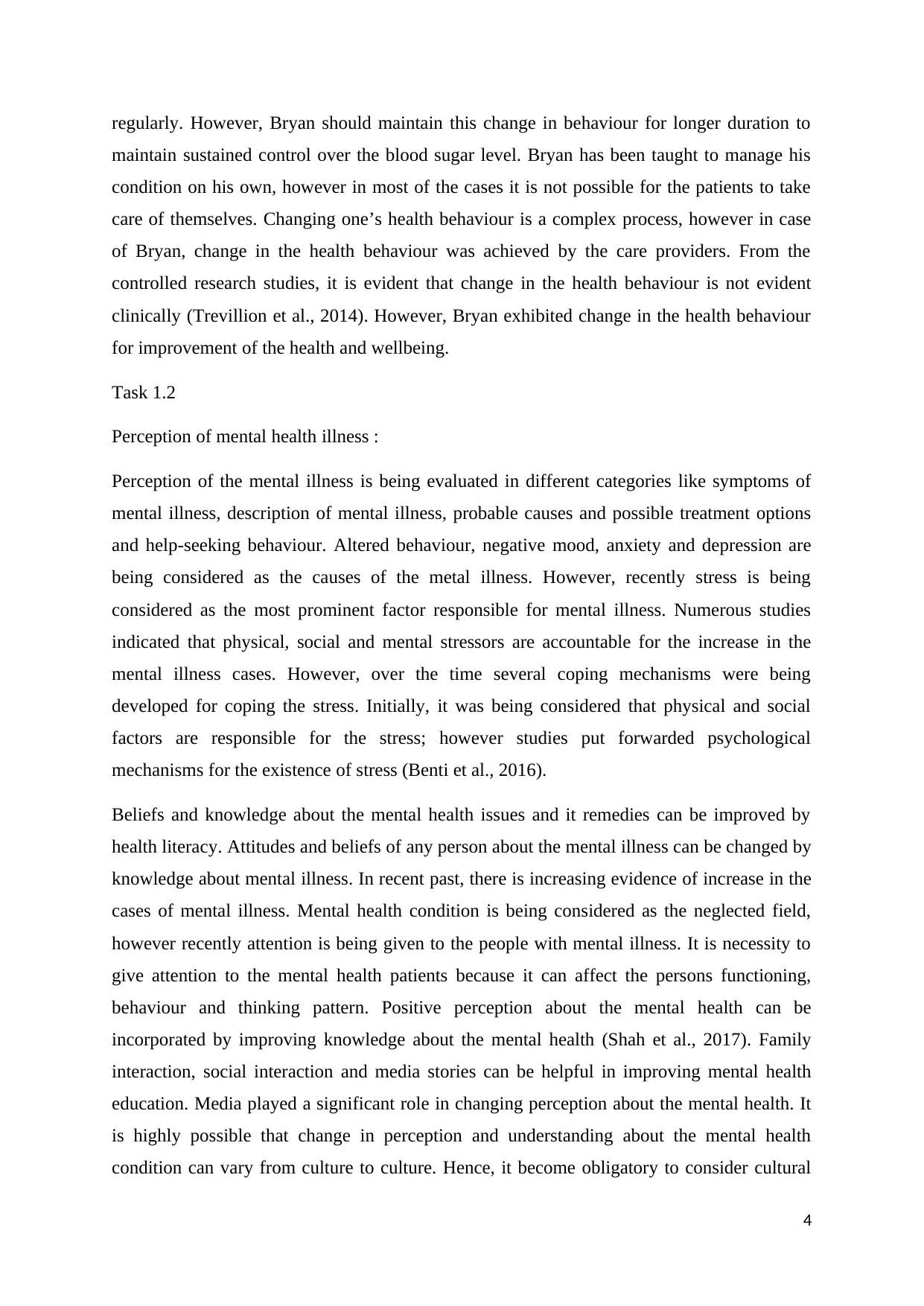
regularly. However, Bryan should maintain this change in behaviour for longer duration to
maintain sustained control over the blood sugar level. Bryan has been taught to manage his
condition on his own, however in most of the cases it is not possible for the patients to take
care of themselves. Changing one’s health behaviour is a complex process, however in case
of Bryan, change in the health behaviour was achieved by the care providers. From the
controlled research studies, it is evident that change in the health behaviour is not evident
clinically (Trevillion et al., 2014). However, Bryan exhibited change in the health behaviour
for improvement of the health and wellbeing.
Task 1.2
Perception of mental health illness :
Perception of the mental illness is being evaluated in different categories like symptoms of
mental illness, description of mental illness, probable causes and possible treatment options
and help-seeking behaviour. Altered behaviour, negative mood, anxiety and depression are
being considered as the causes of the metal illness. However, recently stress is being
considered as the most prominent factor responsible for mental illness. Numerous studies
indicated that physical, social and mental stressors are accountable for the increase in the
mental illness cases. However, over the time several coping mechanisms were being
developed for coping the stress. Initially, it was being considered that physical and social
factors are responsible for the stress; however studies put forwarded psychological
mechanisms for the existence of stress (Benti et al., 2016).
Beliefs and knowledge about the mental health issues and it remedies can be improved by
health literacy. Attitudes and beliefs of any person about the mental illness can be changed by
knowledge about mental illness. In recent past, there is increasing evidence of increase in the
cases of mental illness. Mental health condition is being considered as the neglected field,
however recently attention is being given to the people with mental illness. It is necessity to
give attention to the mental health patients because it can affect the persons functioning,
behaviour and thinking pattern. Positive perception about the mental health can be
incorporated by improving knowledge about the mental health (Shah et al., 2017). Family
interaction, social interaction and media stories can be helpful in improving mental health
education. Media played a significant role in changing perception about the mental health. It
is highly possible that change in perception and understanding about the mental health
condition can vary from culture to culture. Hence, it become obligatory to consider cultural
4
maintain sustained control over the blood sugar level. Bryan has been taught to manage his
condition on his own, however in most of the cases it is not possible for the patients to take
care of themselves. Changing one’s health behaviour is a complex process, however in case
of Bryan, change in the health behaviour was achieved by the care providers. From the
controlled research studies, it is evident that change in the health behaviour is not evident
clinically (Trevillion et al., 2014). However, Bryan exhibited change in the health behaviour
for improvement of the health and wellbeing.
Task 1.2
Perception of mental health illness :
Perception of the mental illness is being evaluated in different categories like symptoms of
mental illness, description of mental illness, probable causes and possible treatment options
and help-seeking behaviour. Altered behaviour, negative mood, anxiety and depression are
being considered as the causes of the metal illness. However, recently stress is being
considered as the most prominent factor responsible for mental illness. Numerous studies
indicated that physical, social and mental stressors are accountable for the increase in the
mental illness cases. However, over the time several coping mechanisms were being
developed for coping the stress. Initially, it was being considered that physical and social
factors are responsible for the stress; however studies put forwarded psychological
mechanisms for the existence of stress (Benti et al., 2016).
Beliefs and knowledge about the mental health issues and it remedies can be improved by
health literacy. Attitudes and beliefs of any person about the mental illness can be changed by
knowledge about mental illness. In recent past, there is increasing evidence of increase in the
cases of mental illness. Mental health condition is being considered as the neglected field,
however recently attention is being given to the people with mental illness. It is necessity to
give attention to the mental health patients because it can affect the persons functioning,
behaviour and thinking pattern. Positive perception about the mental health can be
incorporated by improving knowledge about the mental health (Shah et al., 2017). Family
interaction, social interaction and media stories can be helpful in improving mental health
education. Media played a significant role in changing perception about the mental health. It
is highly possible that change in perception and understanding about the mental health
condition can vary from culture to culture. Hence, it become obligatory to consider cultural
4
Paraphrase This Document
Need a fresh take? Get an instant paraphrase of this document with our AI Paraphraser
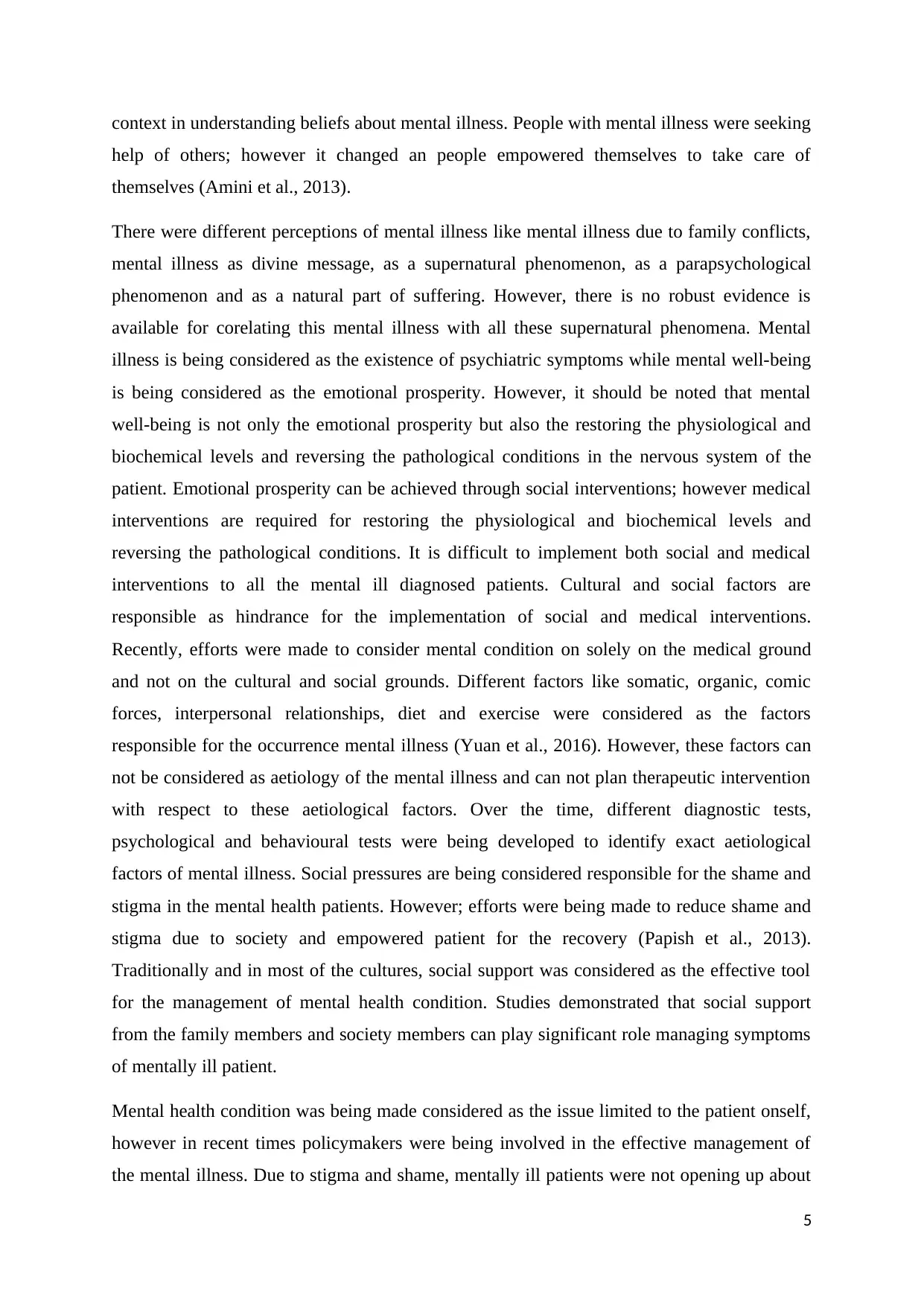
context in understanding beliefs about mental illness. People with mental illness were seeking
help of others; however it changed an people empowered themselves to take care of
themselves (Amini et al., 2013).
There were different perceptions of mental illness like mental illness due to family conflicts,
mental illness as divine message, as a supernatural phenomenon, as a parapsychological
phenomenon and as a natural part of suffering. However, there is no robust evidence is
available for corelating this mental illness with all these supernatural phenomena. Mental
illness is being considered as the existence of psychiatric symptoms while mental well-being
is being considered as the emotional prosperity. However, it should be noted that mental
well-being is not only the emotional prosperity but also the restoring the physiological and
biochemical levels and reversing the pathological conditions in the nervous system of the
patient. Emotional prosperity can be achieved through social interventions; however medical
interventions are required for restoring the physiological and biochemical levels and
reversing the pathological conditions. It is difficult to implement both social and medical
interventions to all the mental ill diagnosed patients. Cultural and social factors are
responsible as hindrance for the implementation of social and medical interventions.
Recently, efforts were made to consider mental condition on solely on the medical ground
and not on the cultural and social grounds. Different factors like somatic, organic, comic
forces, interpersonal relationships, diet and exercise were considered as the factors
responsible for the occurrence mental illness (Yuan et al., 2016). However, these factors can
not be considered as aetiology of the mental illness and can not plan therapeutic intervention
with respect to these aetiological factors. Over the time, different diagnostic tests,
psychological and behavioural tests were being developed to identify exact aetiological
factors of mental illness. Social pressures are being considered responsible for the shame and
stigma in the mental health patients. However; efforts were being made to reduce shame and
stigma due to society and empowered patient for the recovery (Papish et al., 2013).
Traditionally and in most of the cultures, social support was considered as the effective tool
for the management of mental health condition. Studies demonstrated that social support
from the family members and society members can play significant role managing symptoms
of mentally ill patient.
Mental health condition was being made considered as the issue limited to the patient onself,
however in recent times policymakers were being involved in the effective management of
the mental illness. Due to stigma and shame, mentally ill patients were not opening up about
5
help of others; however it changed an people empowered themselves to take care of
themselves (Amini et al., 2013).
There were different perceptions of mental illness like mental illness due to family conflicts,
mental illness as divine message, as a supernatural phenomenon, as a parapsychological
phenomenon and as a natural part of suffering. However, there is no robust evidence is
available for corelating this mental illness with all these supernatural phenomena. Mental
illness is being considered as the existence of psychiatric symptoms while mental well-being
is being considered as the emotional prosperity. However, it should be noted that mental
well-being is not only the emotional prosperity but also the restoring the physiological and
biochemical levels and reversing the pathological conditions in the nervous system of the
patient. Emotional prosperity can be achieved through social interventions; however medical
interventions are required for restoring the physiological and biochemical levels and
reversing the pathological conditions. It is difficult to implement both social and medical
interventions to all the mental ill diagnosed patients. Cultural and social factors are
responsible as hindrance for the implementation of social and medical interventions.
Recently, efforts were made to consider mental condition on solely on the medical ground
and not on the cultural and social grounds. Different factors like somatic, organic, comic
forces, interpersonal relationships, diet and exercise were considered as the factors
responsible for the occurrence mental illness (Yuan et al., 2016). However, these factors can
not be considered as aetiology of the mental illness and can not plan therapeutic intervention
with respect to these aetiological factors. Over the time, different diagnostic tests,
psychological and behavioural tests were being developed to identify exact aetiological
factors of mental illness. Social pressures are being considered responsible for the shame and
stigma in the mental health patients. However; efforts were being made to reduce shame and
stigma due to society and empowered patient for the recovery (Papish et al., 2013).
Traditionally and in most of the cultures, social support was considered as the effective tool
for the management of mental health condition. Studies demonstrated that social support
from the family members and society members can play significant role managing symptoms
of mentally ill patient.
Mental health condition was being made considered as the issue limited to the patient onself,
however in recent times policymakers were being involved in the effective management of
the mental illness. Due to stigma and shame, mentally ill patients were not opening up about
5
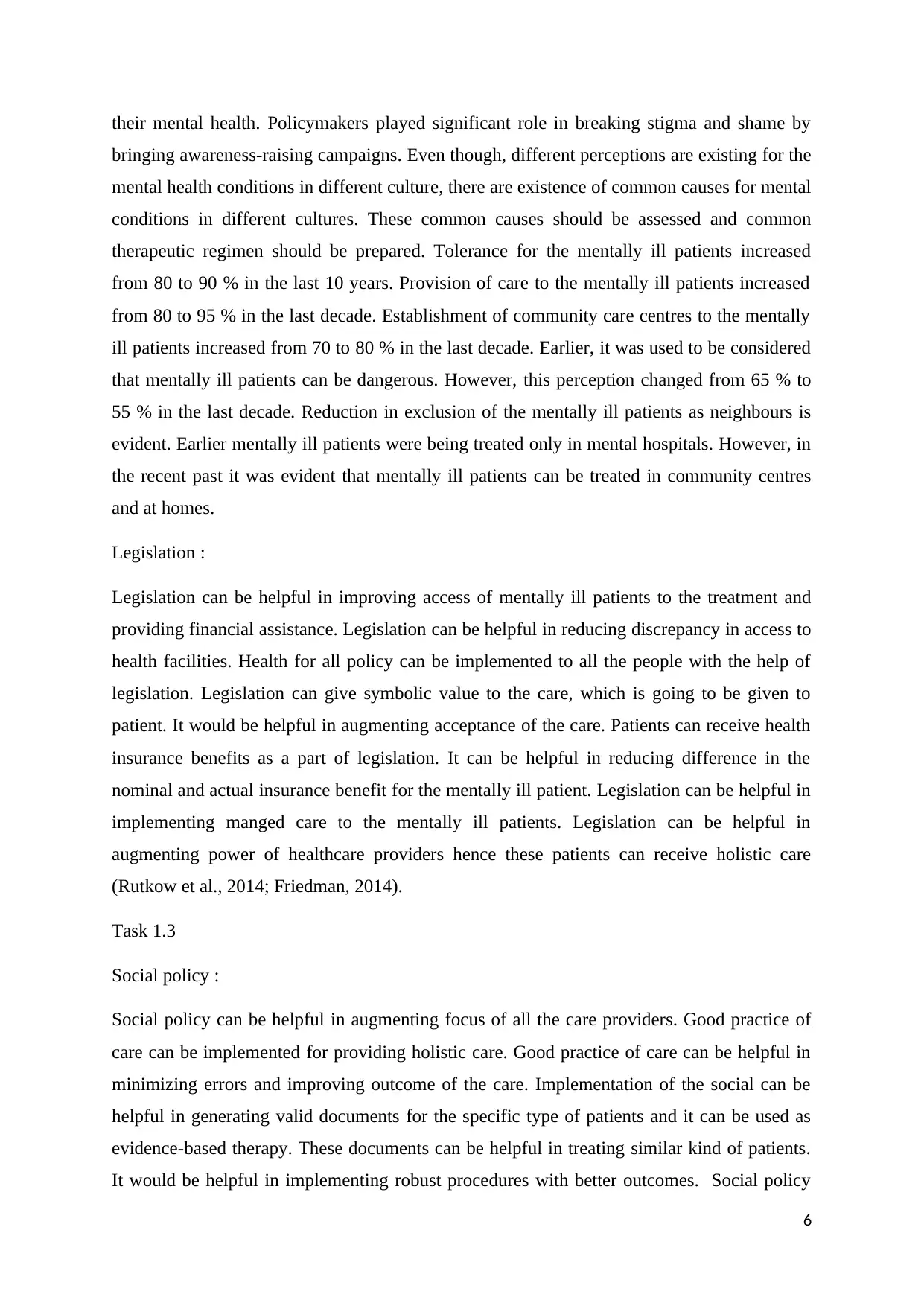
their mental health. Policymakers played significant role in breaking stigma and shame by
bringing awareness-raising campaigns. Even though, different perceptions are existing for the
mental health conditions in different culture, there are existence of common causes for mental
conditions in different cultures. These common causes should be assessed and common
therapeutic regimen should be prepared. Tolerance for the mentally ill patients increased
from 80 to 90 % in the last 10 years. Provision of care to the mentally ill patients increased
from 80 to 95 % in the last decade. Establishment of community care centres to the mentally
ill patients increased from 70 to 80 % in the last decade. Earlier, it was used to be considered
that mentally ill patients can be dangerous. However, this perception changed from 65 % to
55 % in the last decade. Reduction in exclusion of the mentally ill patients as neighbours is
evident. Earlier mentally ill patients were being treated only in mental hospitals. However, in
the recent past it was evident that mentally ill patients can be treated in community centres
and at homes.
Legislation :
Legislation can be helpful in improving access of mentally ill patients to the treatment and
providing financial assistance. Legislation can be helpful in reducing discrepancy in access to
health facilities. Health for all policy can be implemented to all the people with the help of
legislation. Legislation can give symbolic value to the care, which is going to be given to
patient. It would be helpful in augmenting acceptance of the care. Patients can receive health
insurance benefits as a part of legislation. It can be helpful in reducing difference in the
nominal and actual insurance benefit for the mentally ill patient. Legislation can be helpful in
implementing manged care to the mentally ill patients. Legislation can be helpful in
augmenting power of healthcare providers hence these patients can receive holistic care
(Rutkow et al., 2014; Friedman, 2014).
Task 1.3
Social policy :
Social policy can be helpful in augmenting focus of all the care providers. Good practice of
care can be implemented for providing holistic care. Good practice of care can be helpful in
minimizing errors and improving outcome of the care. Implementation of the social can be
helpful in generating valid documents for the specific type of patients and it can be used as
evidence-based therapy. These documents can be helpful in treating similar kind of patients.
It would be helpful in implementing robust procedures with better outcomes. Social policy
6
bringing awareness-raising campaigns. Even though, different perceptions are existing for the
mental health conditions in different culture, there are existence of common causes for mental
conditions in different cultures. These common causes should be assessed and common
therapeutic regimen should be prepared. Tolerance for the mentally ill patients increased
from 80 to 90 % in the last 10 years. Provision of care to the mentally ill patients increased
from 80 to 95 % in the last decade. Establishment of community care centres to the mentally
ill patients increased from 70 to 80 % in the last decade. Earlier, it was used to be considered
that mentally ill patients can be dangerous. However, this perception changed from 65 % to
55 % in the last decade. Reduction in exclusion of the mentally ill patients as neighbours is
evident. Earlier mentally ill patients were being treated only in mental hospitals. However, in
the recent past it was evident that mentally ill patients can be treated in community centres
and at homes.
Legislation :
Legislation can be helpful in improving access of mentally ill patients to the treatment and
providing financial assistance. Legislation can be helpful in reducing discrepancy in access to
health facilities. Health for all policy can be implemented to all the people with the help of
legislation. Legislation can give symbolic value to the care, which is going to be given to
patient. It would be helpful in augmenting acceptance of the care. Patients can receive health
insurance benefits as a part of legislation. It can be helpful in reducing difference in the
nominal and actual insurance benefit for the mentally ill patient. Legislation can be helpful in
implementing manged care to the mentally ill patients. Legislation can be helpful in
augmenting power of healthcare providers hence these patients can receive holistic care
(Rutkow et al., 2014; Friedman, 2014).
Task 1.3
Social policy :
Social policy can be helpful in augmenting focus of all the care providers. Good practice of
care can be implemented for providing holistic care. Good practice of care can be helpful in
minimizing errors and improving outcome of the care. Implementation of the social can be
helpful in generating valid documents for the specific type of patients and it can be used as
evidence-based therapy. These documents can be helpful in treating similar kind of patients.
It would be helpful in implementing robust procedures with better outcomes. Social policy
6
⊘ This is a preview!⊘
Do you want full access?
Subscribe today to unlock all pages.

Trusted by 1+ million students worldwide
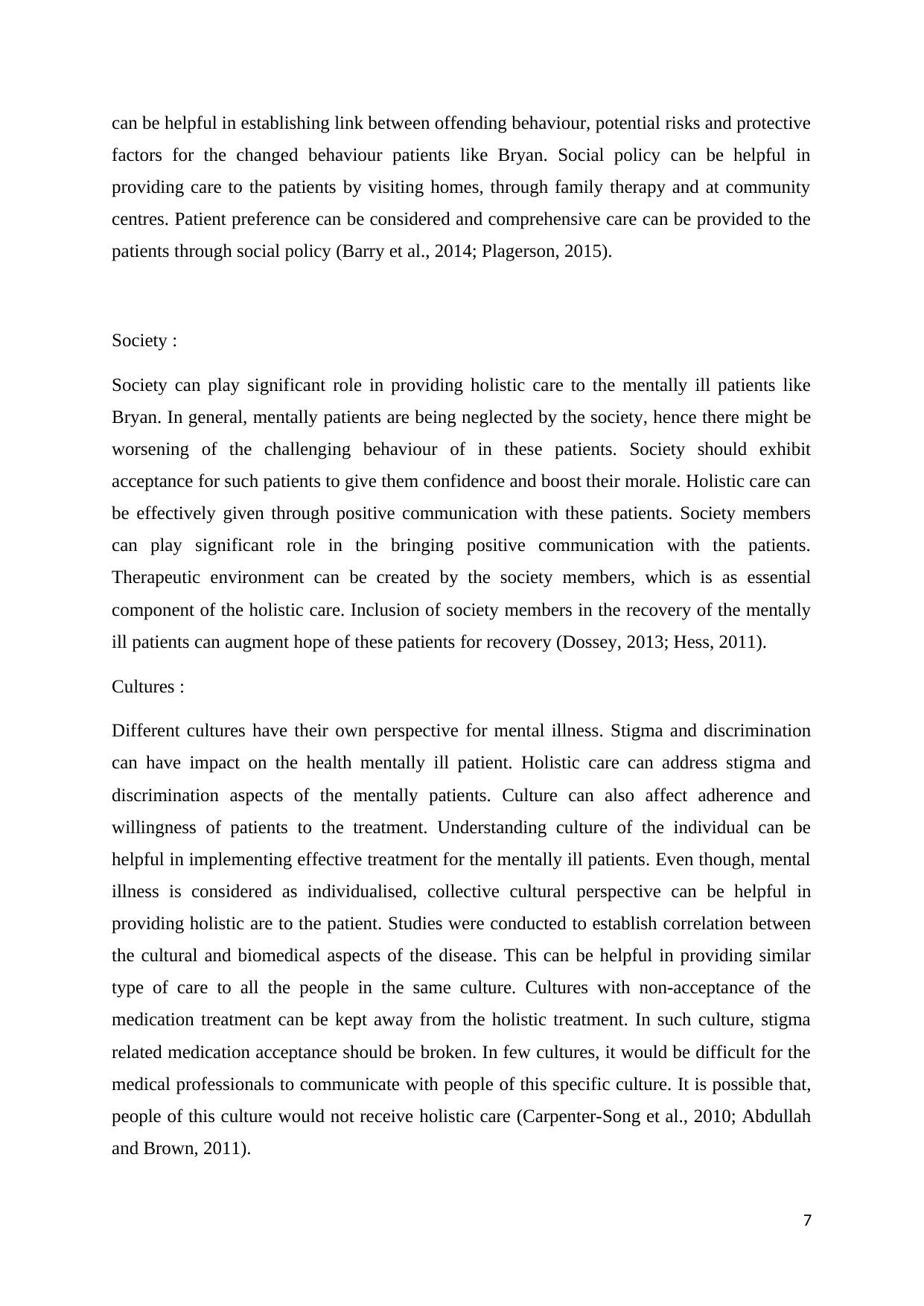
can be helpful in establishing link between offending behaviour, potential risks and protective
factors for the changed behaviour patients like Bryan. Social policy can be helpful in
providing care to the patients by visiting homes, through family therapy and at community
centres. Patient preference can be considered and comprehensive care can be provided to the
patients through social policy (Barry et al., 2014; Plagerson, 2015).
Society :
Society can play significant role in providing holistic care to the mentally ill patients like
Bryan. In general, mentally patients are being neglected by the society, hence there might be
worsening of the challenging behaviour of in these patients. Society should exhibit
acceptance for such patients to give them confidence and boost their morale. Holistic care can
be effectively given through positive communication with these patients. Society members
can play significant role in the bringing positive communication with the patients.
Therapeutic environment can be created by the society members, which is as essential
component of the holistic care. Inclusion of society members in the recovery of the mentally
ill patients can augment hope of these patients for recovery (Dossey, 2013; Hess, 2011).
Cultures :
Different cultures have their own perspective for mental illness. Stigma and discrimination
can have impact on the health mentally ill patient. Holistic care can address stigma and
discrimination aspects of the mentally patients. Culture can also affect adherence and
willingness of patients to the treatment. Understanding culture of the individual can be
helpful in implementing effective treatment for the mentally ill patients. Even though, mental
illness is considered as individualised, collective cultural perspective can be helpful in
providing holistic are to the patient. Studies were conducted to establish correlation between
the cultural and biomedical aspects of the disease. This can be helpful in providing similar
type of care to all the people in the same culture. Cultures with non-acceptance of the
medication treatment can be kept away from the holistic treatment. In such culture, stigma
related medication acceptance should be broken. In few cultures, it would be difficult for the
medical professionals to communicate with people of this specific culture. It is possible that,
people of this culture would not receive holistic care (Carpenter-Song et al., 2010; Abdullah
and Brown, 2011).
7
factors for the changed behaviour patients like Bryan. Social policy can be helpful in
providing care to the patients by visiting homes, through family therapy and at community
centres. Patient preference can be considered and comprehensive care can be provided to the
patients through social policy (Barry et al., 2014; Plagerson, 2015).
Society :
Society can play significant role in providing holistic care to the mentally ill patients like
Bryan. In general, mentally patients are being neglected by the society, hence there might be
worsening of the challenging behaviour of in these patients. Society should exhibit
acceptance for such patients to give them confidence and boost their morale. Holistic care can
be effectively given through positive communication with these patients. Society members
can play significant role in the bringing positive communication with the patients.
Therapeutic environment can be created by the society members, which is as essential
component of the holistic care. Inclusion of society members in the recovery of the mentally
ill patients can augment hope of these patients for recovery (Dossey, 2013; Hess, 2011).
Cultures :
Different cultures have their own perspective for mental illness. Stigma and discrimination
can have impact on the health mentally ill patient. Holistic care can address stigma and
discrimination aspects of the mentally patients. Culture can also affect adherence and
willingness of patients to the treatment. Understanding culture of the individual can be
helpful in implementing effective treatment for the mentally ill patients. Even though, mental
illness is considered as individualised, collective cultural perspective can be helpful in
providing holistic are to the patient. Studies were conducted to establish correlation between
the cultural and biomedical aspects of the disease. This can be helpful in providing similar
type of care to all the people in the same culture. Cultures with non-acceptance of the
medication treatment can be kept away from the holistic treatment. In such culture, stigma
related medication acceptance should be broken. In few cultures, it would be difficult for the
medical professionals to communicate with people of this specific culture. It is possible that,
people of this culture would not receive holistic care (Carpenter-Song et al., 2010; Abdullah
and Brown, 2011).
7
Paraphrase This Document
Need a fresh take? Get an instant paraphrase of this document with our AI Paraphraser

8
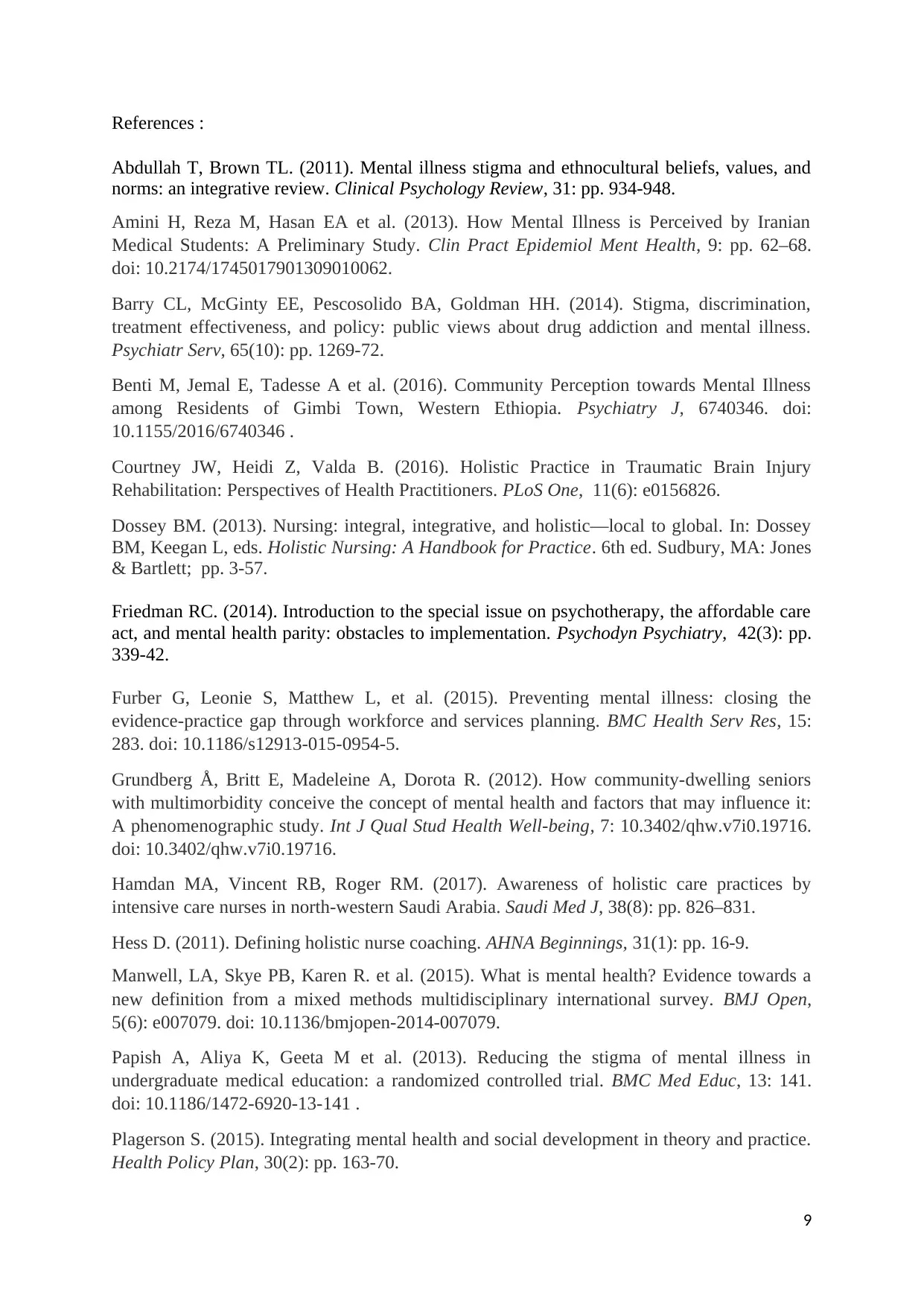
References :
Abdullah T, Brown TL. (2011). Mental illness stigma and ethnocultural beliefs, values, and
norms: an integrative review. Clinical Psychology Review, 31: pp. 934-948.
Amini H, Reza M, Hasan EA et al. (2013). How Mental Illness is Perceived by Iranian
Medical Students: A Preliminary Study. Clin Pract Epidemiol Ment Health, 9: pp. 62–68.
doi: 10.2174/1745017901309010062.
Barry CL, McGinty EE, Pescosolido BA, Goldman HH. (2014). Stigma, discrimination,
treatment effectiveness, and policy: public views about drug addiction and mental illness.
Psychiatr Serv, 65(10): pp. 1269-72.
Benti M, Jemal E, Tadesse A et al. (2016). Community Perception towards Mental Illness
among Residents of Gimbi Town, Western Ethiopia. Psychiatry J, 6740346. doi:
10.1155/2016/6740346 .
Courtney JW, Heidi Z, Valda B. (2016). Holistic Practice in Traumatic Brain Injury
Rehabilitation: Perspectives of Health Practitioners. PLoS One, 11(6): e0156826.
Dossey BM. (2013). Nursing: integral, integrative, and holistic—local to global. In: Dossey
BM, Keegan L, eds. Holistic Nursing: A Handbook for Practice. 6th ed. Sudbury, MA: Jones
& Bartlett; pp. 3-57.
Friedman RC. (2014). Introduction to the special issue on psychotherapy, the affordable care
act, and mental health parity: obstacles to implementation. Psychodyn Psychiatry, 42(3): pp.
339-42.
Furber G, Leonie S, Matthew L, et al. (2015). Preventing mental illness: closing the
evidence-practice gap through workforce and services planning. BMC Health Serv Res, 15:
283. doi: 10.1186/s12913-015-0954-5.
Grundberg Å, Britt E, Madeleine A, Dorota R. (2012). How community-dwelling seniors
with multimorbidity conceive the concept of mental health and factors that may influence it:
A phenomenographic study. Int J Qual Stud Health Well-being, 7: 10.3402/qhw.v7i0.19716.
doi: 10.3402/qhw.v7i0.19716.
Hamdan MA, Vincent RB, Roger RM. (2017). Awareness of holistic care practices by
intensive care nurses in north-western Saudi Arabia. Saudi Med J, 38(8): pp. 826–831.
Hess D. (2011). Defining holistic nurse coaching. AHNA Beginnings, 31(1): pp. 16-9.
Manwell, LA, Skye PB, Karen R. et al. (2015). What is mental health? Evidence towards a
new definition from a mixed methods multidisciplinary international survey. BMJ Open,
5(6): e007079. doi: 10.1136/bmjopen-2014-007079.
Papish A, Aliya K, Geeta M et al. (2013). Reducing the stigma of mental illness in
undergraduate medical education: a randomized controlled trial. BMC Med Educ, 13: 141.
doi: 10.1186/1472-6920-13-141 .
Plagerson S. (2015). Integrating mental health and social development in theory and practice.
Health Policy Plan, 30(2): pp. 163-70.
9
Abdullah T, Brown TL. (2011). Mental illness stigma and ethnocultural beliefs, values, and
norms: an integrative review. Clinical Psychology Review, 31: pp. 934-948.
Amini H, Reza M, Hasan EA et al. (2013). How Mental Illness is Perceived by Iranian
Medical Students: A Preliminary Study. Clin Pract Epidemiol Ment Health, 9: pp. 62–68.
doi: 10.2174/1745017901309010062.
Barry CL, McGinty EE, Pescosolido BA, Goldman HH. (2014). Stigma, discrimination,
treatment effectiveness, and policy: public views about drug addiction and mental illness.
Psychiatr Serv, 65(10): pp. 1269-72.
Benti M, Jemal E, Tadesse A et al. (2016). Community Perception towards Mental Illness
among Residents of Gimbi Town, Western Ethiopia. Psychiatry J, 6740346. doi:
10.1155/2016/6740346 .
Courtney JW, Heidi Z, Valda B. (2016). Holistic Practice in Traumatic Brain Injury
Rehabilitation: Perspectives of Health Practitioners. PLoS One, 11(6): e0156826.
Dossey BM. (2013). Nursing: integral, integrative, and holistic—local to global. In: Dossey
BM, Keegan L, eds. Holistic Nursing: A Handbook for Practice. 6th ed. Sudbury, MA: Jones
& Bartlett; pp. 3-57.
Friedman RC. (2014). Introduction to the special issue on psychotherapy, the affordable care
act, and mental health parity: obstacles to implementation. Psychodyn Psychiatry, 42(3): pp.
339-42.
Furber G, Leonie S, Matthew L, et al. (2015). Preventing mental illness: closing the
evidence-practice gap through workforce and services planning. BMC Health Serv Res, 15:
283. doi: 10.1186/s12913-015-0954-5.
Grundberg Å, Britt E, Madeleine A, Dorota R. (2012). How community-dwelling seniors
with multimorbidity conceive the concept of mental health and factors that may influence it:
A phenomenographic study. Int J Qual Stud Health Well-being, 7: 10.3402/qhw.v7i0.19716.
doi: 10.3402/qhw.v7i0.19716.
Hamdan MA, Vincent RB, Roger RM. (2017). Awareness of holistic care practices by
intensive care nurses in north-western Saudi Arabia. Saudi Med J, 38(8): pp. 826–831.
Hess D. (2011). Defining holistic nurse coaching. AHNA Beginnings, 31(1): pp. 16-9.
Manwell, LA, Skye PB, Karen R. et al. (2015). What is mental health? Evidence towards a
new definition from a mixed methods multidisciplinary international survey. BMJ Open,
5(6): e007079. doi: 10.1136/bmjopen-2014-007079.
Papish A, Aliya K, Geeta M et al. (2013). Reducing the stigma of mental illness in
undergraduate medical education: a randomized controlled trial. BMC Med Educ, 13: 141.
doi: 10.1186/1472-6920-13-141 .
Plagerson S. (2015). Integrating mental health and social development in theory and practice.
Health Policy Plan, 30(2): pp. 163-70.
9
⊘ This is a preview!⊘
Do you want full access?
Subscribe today to unlock all pages.

Trusted by 1+ million students worldwide
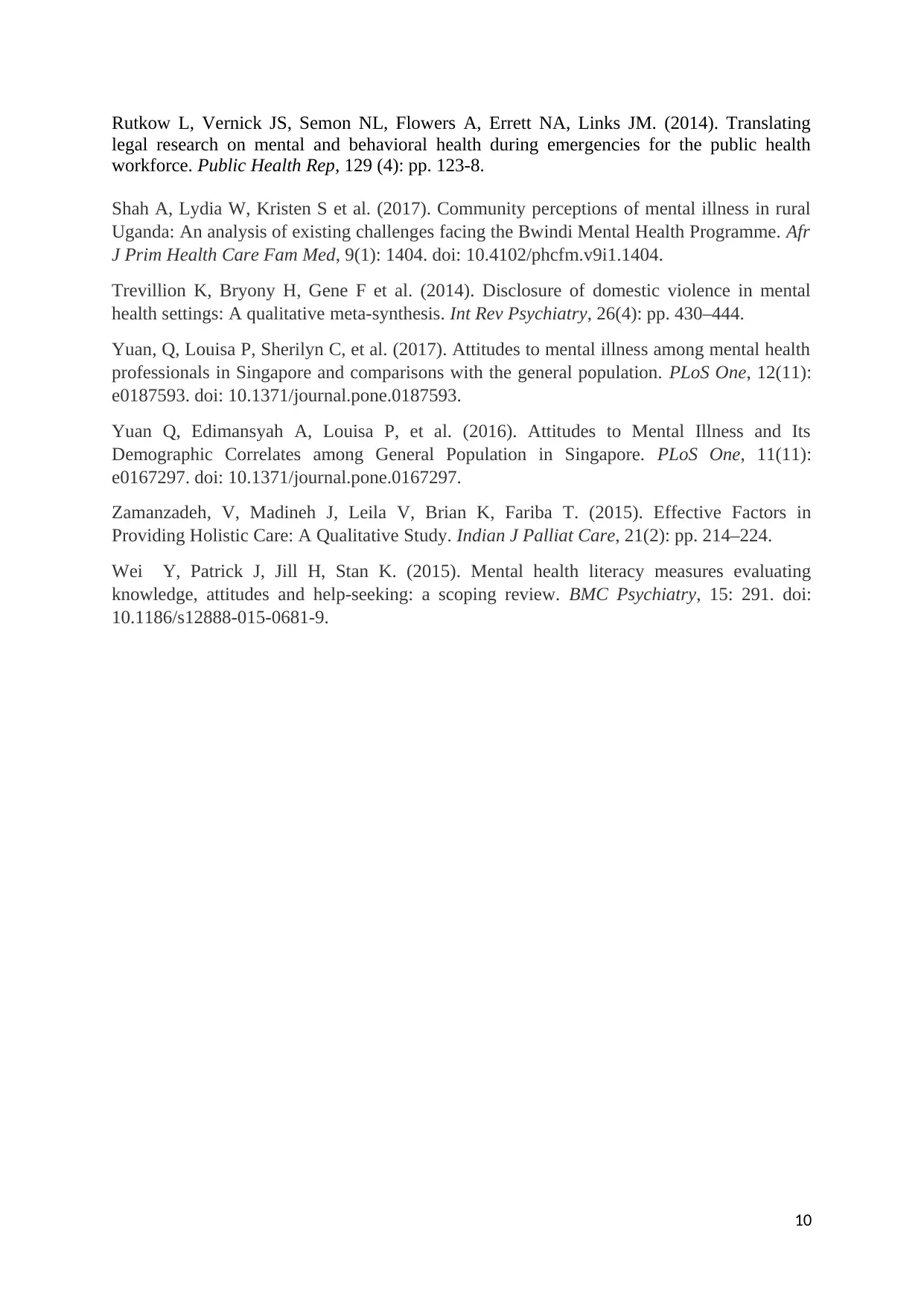
Rutkow L, Vernick JS, Semon NL, Flowers A, Errett NA, Links JM. (2014). Translating
legal research on mental and behavioral health during emergencies for the public health
workforce. Public Health Rep, 129 (4): pp. 123-8.
Shah A, Lydia W, Kristen S et al. (2017). Community perceptions of mental illness in rural
Uganda: An analysis of existing challenges facing the Bwindi Mental Health Programme. Afr
J Prim Health Care Fam Med, 9(1): 1404. doi: 10.4102/phcfm.v9i1.1404.
Trevillion K, Bryony H, Gene F et al. (2014). Disclosure of domestic violence in mental
health settings: A qualitative meta-synthesis. Int Rev Psychiatry, 26(4): pp. 430–444.
Yuan, Q, Louisa P, Sherilyn C, et al. (2017). Attitudes to mental illness among mental health
professionals in Singapore and comparisons with the general population. PLoS One, 12(11):
e0187593. doi: 10.1371/journal.pone.0187593.
Yuan Q, Edimansyah A, Louisa P, et al. (2016). Attitudes to Mental Illness and Its
Demographic Correlates among General Population in Singapore. PLoS One, 11(11):
e0167297. doi: 10.1371/journal.pone.0167297.
Zamanzadeh, V, Madineh J, Leila V, Brian K, Fariba T. (2015). Effective Factors in
Providing Holistic Care: A Qualitative Study. Indian J Palliat Care, 21(2): pp. 214–224.
Wei Y, Patrick J, Jill H, Stan K. (2015). Mental health literacy measures evaluating
knowledge, attitudes and help-seeking: a scoping review. BMC Psychiatry, 15: 291. doi:
10.1186/s12888-015-0681-9.
10
legal research on mental and behavioral health during emergencies for the public health
workforce. Public Health Rep, 129 (4): pp. 123-8.
Shah A, Lydia W, Kristen S et al. (2017). Community perceptions of mental illness in rural
Uganda: An analysis of existing challenges facing the Bwindi Mental Health Programme. Afr
J Prim Health Care Fam Med, 9(1): 1404. doi: 10.4102/phcfm.v9i1.1404.
Trevillion K, Bryony H, Gene F et al. (2014). Disclosure of domestic violence in mental
health settings: A qualitative meta-synthesis. Int Rev Psychiatry, 26(4): pp. 430–444.
Yuan, Q, Louisa P, Sherilyn C, et al. (2017). Attitudes to mental illness among mental health
professionals in Singapore and comparisons with the general population. PLoS One, 12(11):
e0187593. doi: 10.1371/journal.pone.0187593.
Yuan Q, Edimansyah A, Louisa P, et al. (2016). Attitudes to Mental Illness and Its
Demographic Correlates among General Population in Singapore. PLoS One, 11(11):
e0167297. doi: 10.1371/journal.pone.0167297.
Zamanzadeh, V, Madineh J, Leila V, Brian K, Fariba T. (2015). Effective Factors in
Providing Holistic Care: A Qualitative Study. Indian J Palliat Care, 21(2): pp. 214–224.
Wei Y, Patrick J, Jill H, Stan K. (2015). Mental health literacy measures evaluating
knowledge, attitudes and help-seeking: a scoping review. BMC Psychiatry, 15: 291. doi:
10.1186/s12888-015-0681-9.
10
1 out of 10
Related Documents
Your All-in-One AI-Powered Toolkit for Academic Success.
+13062052269
info@desklib.com
Available 24*7 on WhatsApp / Email
![[object Object]](/_next/static/media/star-bottom.7253800d.svg)
Unlock your academic potential
Copyright © 2020–2026 A2Z Services. All Rights Reserved. Developed and managed by ZUCOL.





